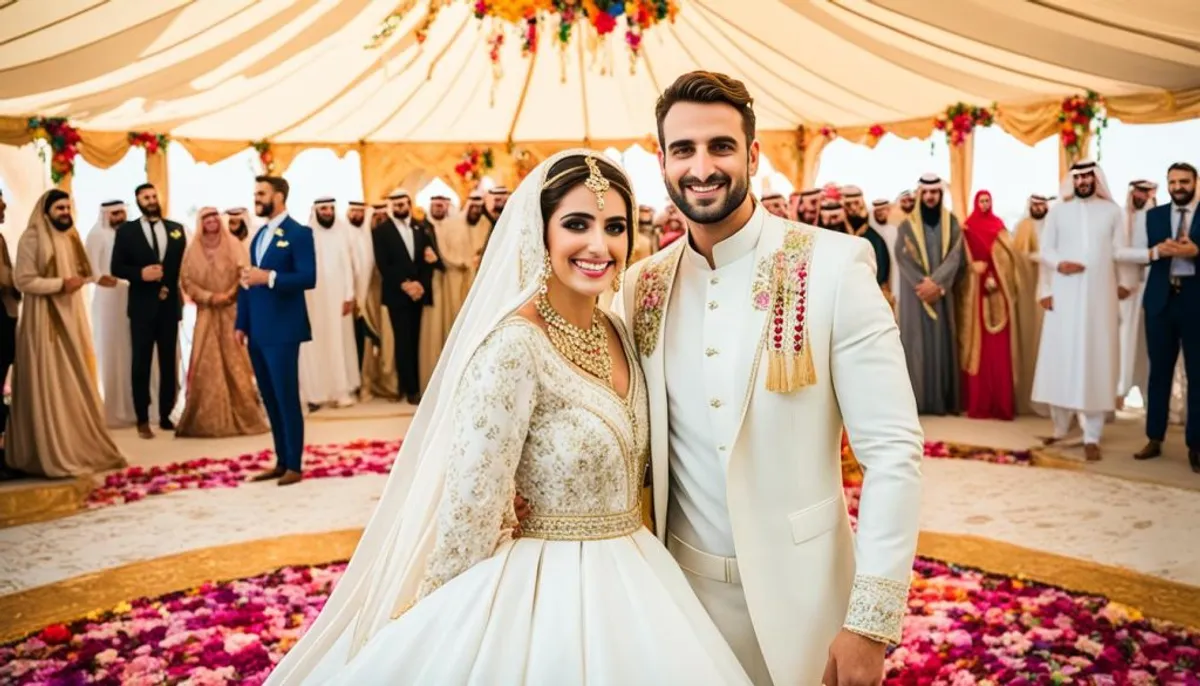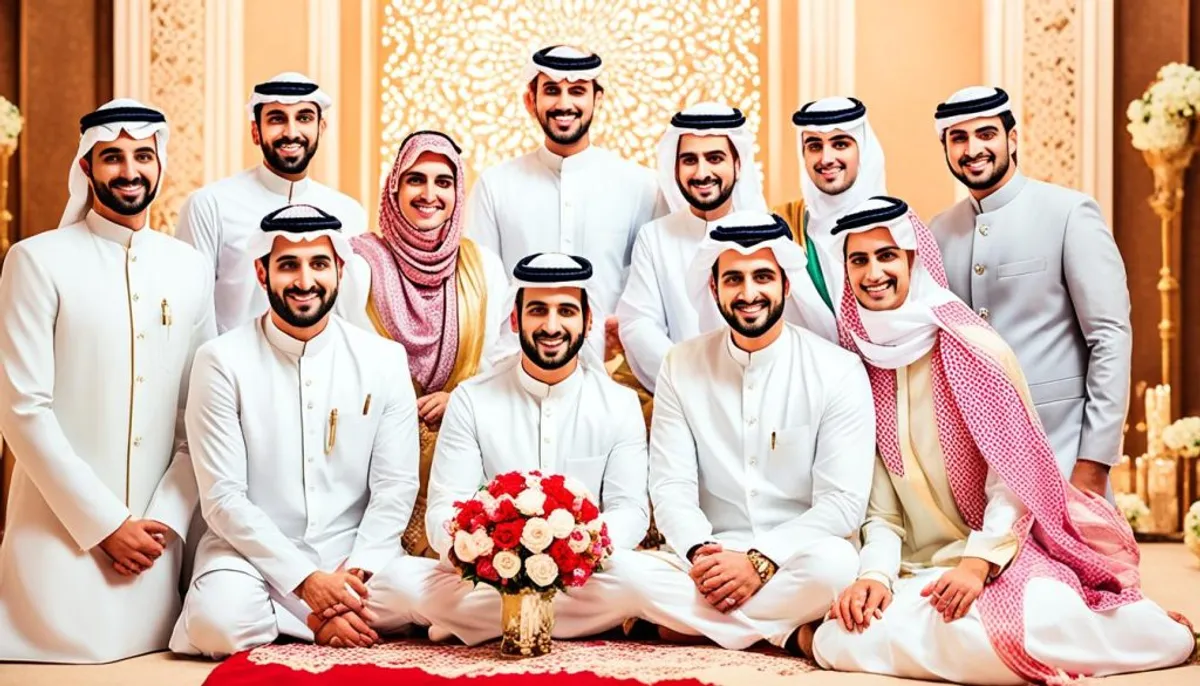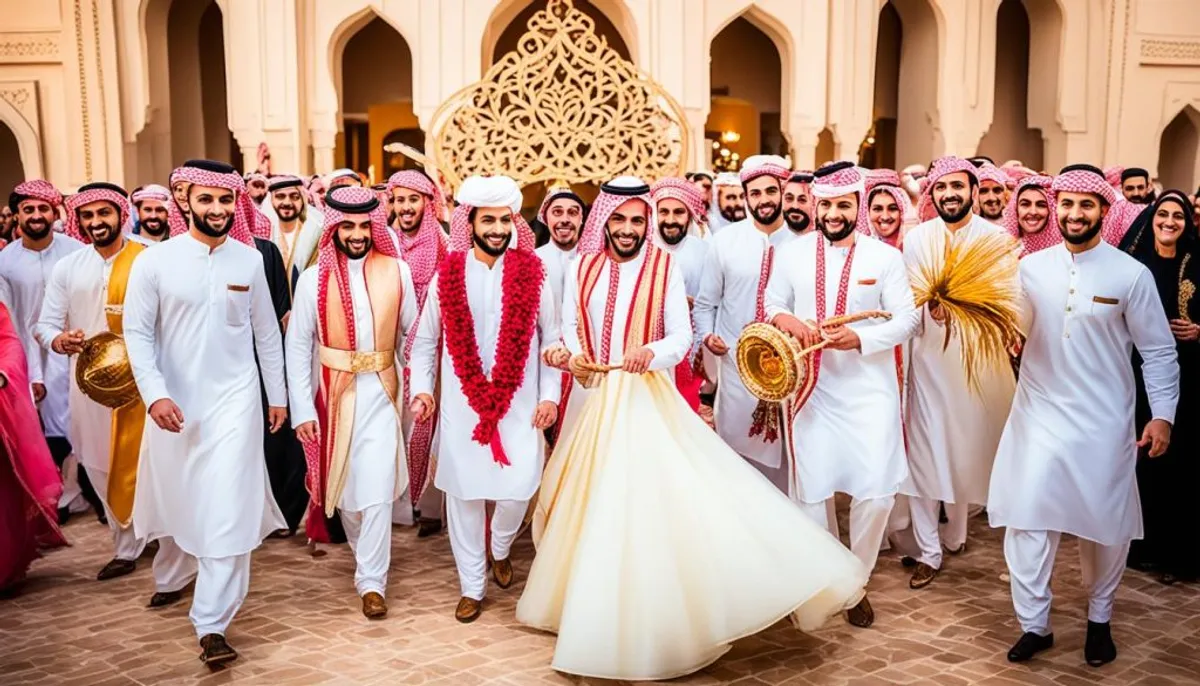Saudi Arabia is known for its deep traditions and rich heritage. Its wedding culture is unique and enchanting. A traditional Arab wedding in Saudi Arabia is a big celebration. It brings together families, communities, and many time-honored rituals.

Engagement ceremonies, pre-wedding festivities, and the big wedding day are all part of Saudi Arabia’s wedding traditions. These customs show a rich cultural heritage. We will look into the history, symbolism, and social aspects of these customs. This will help us understand why weddings are so important in Saudi Arabian society.
The Cultural Significance of Weddings in Saudi Arabia
In Saudi Arabia, weddings are very important. They show the deep traditions and values of the area. The history of wedding traditions here is tied to the value of family unity and the sacredness of marriage. A key part of Saudi cultural wedding traditions is arranged marriages. Here, families help choose partners for their children.
History and Origins of Saudi Wedding Traditions
The history of wedding traditions in Saudi Arabia goes back to its rich culture and religion. Weddings are seen as a sacred bond between two families, not just two people. This view has shaped cultural wedding traditions over time. It shows the deep respect for family unity and marriage.
The Role of Families in Arranging Marriages
In Saudi Arabia, families are key in finding partners for their children. Arranged marriages are common, with parents leading the search. But, there’s a shift towards modern vs traditional weddings. Now, there’s more focus on the couple’s wishes and choices.
| Traditional Weddings | Modern Weddings |
|---|---|
| Family-centric matchmaking | Greater emphasis on individual choice |
| Strict adherence to cultural and religious customs | Blending of traditional and contemporary elements |
| Limited personal involvement in the engagement process | Increased personal involvement in the engagement process |
The Engagement Ceremony (Khitbah)
In Saudi Arabian wedding customs, the engagement ceremony, known as “Khitbah,” is very important. It’s a key moment when the groom gives gifts to the bride. These gifts show his promise of marriage.
Symbolic Rituals and Gift Exchanges
The Khitbah ceremony is filled with deep meaning. It shows how important weddings are in Saudi Arabia. The groom must be there to give rings to the bride and show he wants to marry her.
Gifts are a big part of this tradition. The groom might give the bride jewelry or other items that mean a lot. These gifts show his love and the future they share.
The Khitbah ceremony is a big step in the wedding customs around the world. It makes the engagement official and gets everyone ready for the big celebrations ahead.

why wedding traditions: Pre-Wedding Celebrations
In Saudi Arabian wedding traditions, the pre-wedding festivities are key. They celebrate the union of two families. The Henna Night is a big event that kicks off the wedding celebrations.
Henna Night and Other Festivities
The Henna Night, or Layla al-Hinna, is for women only. It’s where the bride-to-be gets henna designs on her hands and feet. This tradition means fertility, beauty, and passing on blessings from older women to the bride.
While the Henna Night is for women, the groom might join in with his friends and family. He might take part in other customs before the wedding.
There are more festivities before the wedding, each with its own special meaning. These include Al-Shabka, where the groom gives the bride jewelry. And Al-Mayyas, a party where the bride and her friends dance and sing.
These celebrations are for the bride, groom, and their families. They bring everyone together. It’s a chance to celebrate the rich culture of Saudi Arabian weddings.
The Grand Wedding Day
On the wedding day, the groom shines as he leads the zaffa procession. This tradition is full of joy and pride. The groom, with his male friends and family, walks to the bride’s house to meet his future wife.
The groom looks his best in traditional wedding attire. He wears a thobe or a stylish suit with cultural accessories. This mix of old and new makes the day unforgettable.
The groom’s family is in charge of hosting wedding guests. But the groom makes sure everyone feels at home. His friendly nature and attention to guests make the wedding a hit.
The Zaffa Procession and Traditional Attire
The zaffa procession is a key part of the wedding. It’s a lively tradition where the groom, with his friends and family, heads to the bride’s place. The music and the march set the mood for the day.
The groom’s traditional wedding attire is important. He wears a thobe or a suit with cultural touches. These add to the bride’s beauty and make the procession stand out.
Hosting Guests and Celebrations
The groom’s family is key in hosting wedding guests. But the groom also makes sure everyone is happy. His friendly nature and eye for detail make the event memorable.
The wedding day in Saudi Arabia is a big celebration. It highlights the groom’s role in the zaffa procession, his traditional wedding attire, and his part in hosting wedding guests. It shows the country’s rich culture and traditions.

Unique Saudi Wedding Customs
Saudi Arabian weddings have customs that show the area’s rich culture. The Shabka, Tehwal, and Zowarah are three special practices. They highlight the region’s unique traditions.
Shabka, Tehwal, and Zowarah
The Shabka is when the groom gives the bride’s mother gold or jewelry. This is part of a bigger set of gifts. It shows the groom’s commitment and his financial standing.
The Tehwal is a dinner the groom’s family hosts the day after the wedding. It welcomes the bride into their family. This dinner helps the newlyweds meet their extended family and feel at home.
The Zowarah is a celebration by either the groom’s or the bride’s family after the honeymoon. It lets the community congratulate the couple. This shows how important social ties are in Saudi Arabian regional wedding traditions.
These customs show how Saudi Arabia’s traditions blend old and new. They make unique wedding traditions that are special.
Conclusion
Saudi Arabian wedding traditions show the deep cultural values that bring families and communities together. These customs start with the engagement and end with the big wedding day. They change with time but keep their deep meaning.
These weddings show the importance of family, community, and the bond between two people. As Saudi Arabia changes socially and economically, its wedding traditions stay strong. They show the country’s cultural identity and its commitment to celebrating big moments.
As we end our look at Saudi Arabian wedding customs, we value their cultural heritage more. The mix of old and new traditions reminds us why they matter. They keep the rich culture of Saudi Arabian society alive.
RelatedRelated articles



